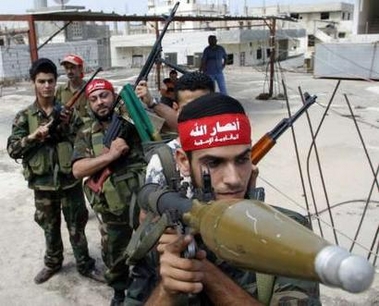 by Nicolas Tohme June 5 – NAHR AL-BARED, Lebanon (AFP) – Tensions remained high in Lebanon on Tuesday as government forces battled to crush Islamist militants around a Palestinian refugee camp and another bomb blast struck the capital. Fighters from the Al-Qaeda inspired Fatah al Islam militia responded with automatic weapons fire as the army pounded their positions overnight in the squalid Nahr al-Bared camp in northern Lebanon, correspondents said.
by Nicolas Tohme June 5 – NAHR AL-BARED, Lebanon (AFP) – Tensions remained high in Lebanon on Tuesday as government forces battled to crush Islamist militants around a Palestinian refugee camp and another bomb blast struck the capital. Fighters from the Al-Qaeda inspired Fatah al Islam militia responded with automatic weapons fire as the army pounded their positions overnight in the squalid Nahr al-Bared camp in northern Lebanon, correspondents said.
A Red Cross convoy of ambulances and trucks loaded with medicine waited to enter the camp during a lull to supply the refugees left in Nahr al-Bared, estimated to number between 3,000 and 5,000 of its original 31,000 inhabitants. However, several fighters from the Sunni Muslim gang have turned themselves in, the mainstream Palestinian faction Fatah said. "They surrendered on Monday and Tuesday to Fatah men in the Nahr al-Bared camp," said Fatah’s number two in Lebanon, Khaled al-Aref. "We can confirm that men from Fatah al-Islam turned themselves in and handed over their weapons."
There was no immediate confirmation from the Arab militant group and a Lebanese army spokesman, too, could not confirm the surrenders."We have information that there were some elements which gave themselves up, but the army has not received any of them," he told AFP.
We have information that some elements have also dropped their arms and left the fight as many of them are in poor spirits," he added.
"Now the army continues to tighten the noose on the gunmen, respond to the source of fire, track down armed elements and clear areas where there are explosives" around the camp.
No casualties had been reported Tuesday, the spokesman said.
Armed Palestinian groups such as Fatah are in charge of security at Lebanon’s dozen refugee camps which remain outside the control of the Lebanese authorities.
In all, 108 people have been killed in 17 days of bloodshed, the deadliest internal feuding since the 1975-1990 civil war that has added to tensions in a country already in the grip of an acute political crisis.
In north Lebanon, troops including about 1,000 crack commandos were tightening the noose around the militants holed up in Nahr al-Bared, where both sides have vowed to fight to the end.
Prime Minister Fuad Siniora has warned Fatah al-Islam to surrender or be wiped out.
The unrest is centred around Nahr al-Bared on the Mediterranean shore where troops have being laying siege to Fatah al-Islam, a group numbering about 150 militants which first emerged late last year.
But fears it could spread through other camps were fuelled when deadly fighting broke out on Sunday at the Ain al-Helweh camp between the army and members of another shadowy group known as Jund al-Sham or Soldiers of Damascus.
And underscoring the fragile security situation, a bomb ripped through a public bus in Christian east Beirut on Monday, wounding at least 10 people, a security source said.
The explosion in the mixed residential and industrial district of Sed al-Baushrieh was the fourth to rock Lebanon since the clashes between the army and the Islamists broke out on May 20.
"The bombings and the clashes are connected," Information Minister Ghazi Aridi said after an emergency cabinet meeting.
The security source said one suspect had been arrested.
However, the situation remained calm around Ain al-Helweh in the southern city of Sidon on Tuesday after the fighting that left two Islamists and two soldiers dead the previous day.
Palestinian groups had agreed on Monday night to deploy police units, with different factions taking charge of different sectors.
Jund al-Sham, which has no clear hierarchy or particular leader, is believed to have about 50 militants armed with assault rifles, mortars and rocket-propelled grenades.
The escalation of violence has prompted Washington to pledge more supplies to the Lebanese army after Congress last month approved a seven-fold increase in military assistance for 2007 to 280 million dollars.
It is not known whether the army is planning a ground assault on Nahr al-Bared. By longstanding convention, it does not enter Lebanon’s Palestinian refugee camps, leaving security inside to Palestinian groups.



